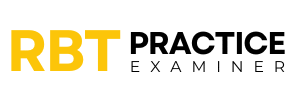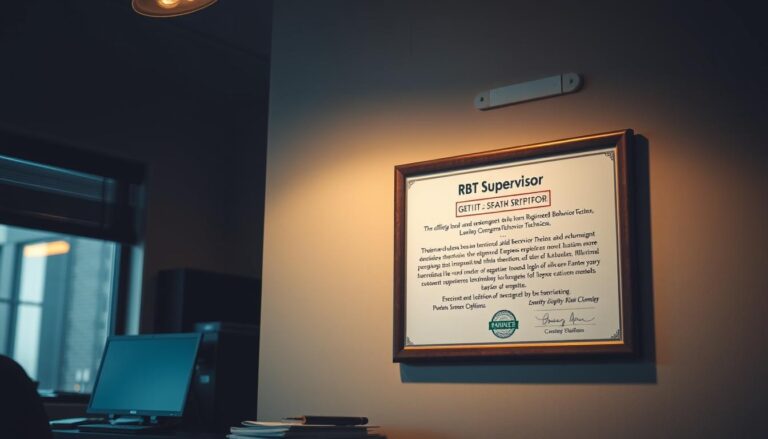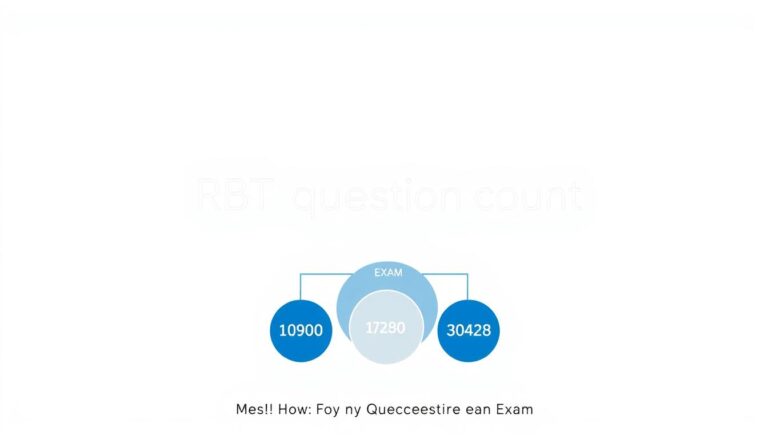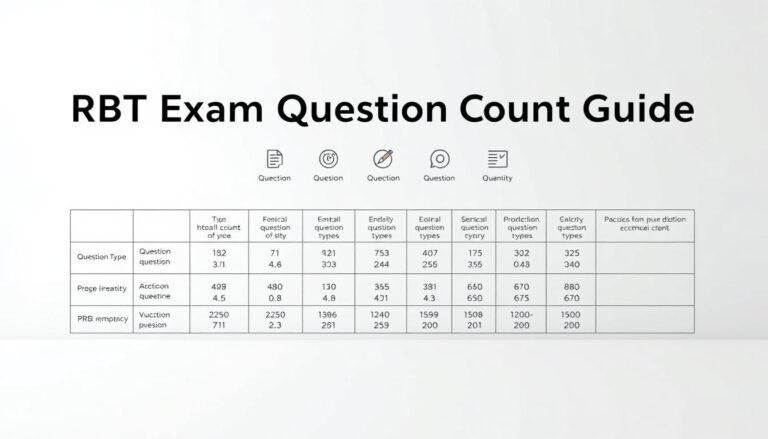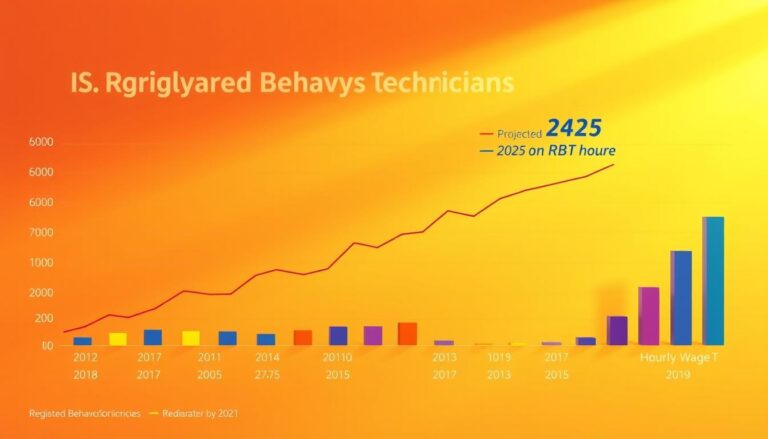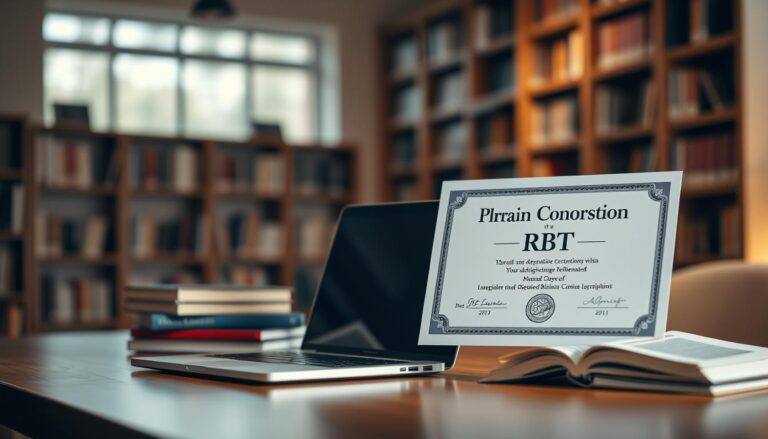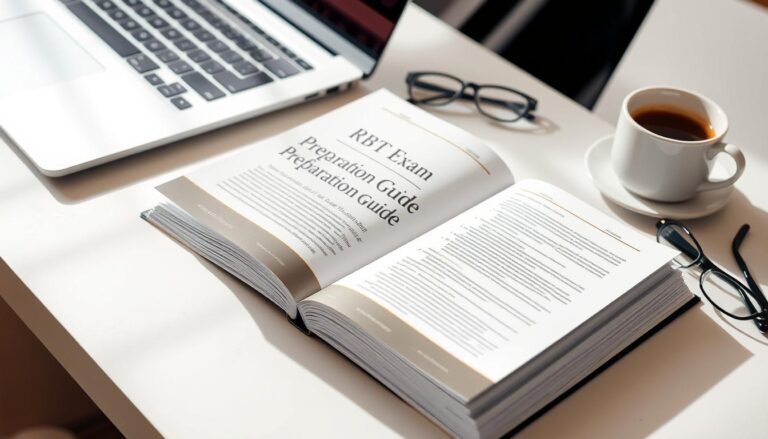Psychology-Based RBT Exam Tips : That Actually Work
Getting ready for the Registered Behavior Technician (RBT) exam can be tough. But, psychology offers smart ways to study and do well on the test. Our tips use science to help you learn better than just memorizing.
Good study methods use how our brains work. By applying what we know about learning, you can make a study plan that works. This plan helps you learn more and feel less stressed during the test.
This guide will show you how to use science to ace the RBT exam. We’ll cover how to remember things better and handle test stress. These strategies can really help you pass.
These tips are for anyone taking the RBT exam. They give you the tools and confidence to do well. You’ll be ready to succeed in your certification journey.
Understanding the Psychology Behind Effective RBT Exam Preparation
Getting ready for the RBT exam is more than just memorizing facts. Winners know the psychological tricks that help them learn and remember better. By using expert advice, they create the best study plans to reach their full score.
Studies show how our brains handle and keep complex info. Knowing this can change how you study and boost your success chances.
Cognitive Load Theory and Study Management
Cognitive load theory explains how our brains handle info. When studying for the RBT exam, students should:
- Break down big topics into smaller parts
- Focus on the most important info
- Use pictures and diagrams to ease mental effort
- Stay away from too much info at once
Memory Consolidation Techniques
Good memory keeping needs smart learning methods. These help move info from short-term to long-term memory. Key methods include:
- Practicing recalling info
- Using spaced repetition
- Learning in context
- Studying in different ways
Stress Response Management
Handling exam stress is key for doing your best. Use these mental tricks to stay calm and focused:
| Stress Management Technique | Benefit |
|---|---|
| Mindfulness meditation | Reduces anxiety, improves focus |
| Deep breathing exercises | Lowers stress response |
| Structured study schedule | Makes studying predictable, less uncertain |
By using these mental strategies, RBT exam takers can create a detailed and effective study plan. It’s more than just memorizing.
Psychology-Backed RBT Exam Tips for Maximum Retention
Passing the RBT exam is not just about memorizing facts. It’s about using psychology to learn and remember better. Our best tips mix brain science with smart study habits.
Good exam prep uses smart mental tricks, not just studying. Here are some key psychological methods to help you do well:
- Elaborative Rehearsal: Link new info to what you already know
- Make up mnemonic devices for easy remembering
- Practice recalling info to make your brain stronger
- Use pictures to help remember tough ideas
Cognitive psychology teaches us a lot about learning. The chunking method breaks down hard exam material into smaller bits. This makes it easier to remember important details during the test.
Creating mental links is key for keeping info long-term. Try these top tips:
- Draw out how ideas are connected
- Use stories to remember key points
- Make personal reminders to help you remember
- Test yourself often
Good exam prep is about understanding, not just memorizing. Dive deep into the material, ask questions, and make each concept meaningful. Your brain will hold onto info better when you really get it, not just try to memorize it.
The Science of Memory: Optimizing Your Study Sessions
Mastering memory techniques is key to acing your ultimate RBT exam guide. Knowing how our brain handles and keeps information can make studying more effective. It also boosts your confidence.
Memory isn’t just about putting in effort. It’s about using smart strategies. Psychology experts say that how you study is more important than how long you study.
Active Recall Methods
Active recall turns passive reading into active learning. This method involves testing yourself often instead of just re-reading.
- Create flashcards with key RBT concepts
- Practice explaining complex topics out loud
- Use practice questions to challenge your understanding
Spaced Repetition Strategies
Spaced repetition uses memory consolidation principles. Instead of cramming, spread your study sessions across days or weeks.
- Review materials after 24 hours
- Revisit content after one week
- Check understanding after one month
Visual Learning Integration
Visual learning can speed up memory retention. Diagrams, mind maps, and color-coded notes make complex info easier to remember.
- Create colorful mind maps
- Draw connection diagrams
- Use infographics to simplify complex topics
Creating an Optimal Mental State for RBT Exam Success
Getting ready for the RBT exam is more than just memorizing facts. It’s about getting your mind ready too. Your mindset can really affect how well you do and how much you remember.
Having a growth mindset is key to doing well on the RBT exam. It turns problems into chances to learn and get better. People with this mindset usually do better on tests and are more resilient.
- Recognize your ability to grow
- See challenges as chances to learn
- Use positive self-talk
- See mistakes as part of learning
Studies show that feeling confident can really help you do well on exams. By using the right mental strategies, you can build a strong foundation for success.
| Mental State Strategy | Psychological Benefit |
|---|---|
| Visualization Techniques | Reduces Anxiety, Increases Confidence |
| Mindfulness Meditation | Improves Focus, Emotional Regulation |
| Positive Affirmations | Boosts Self-Belief, Motivation |
Using these tips can change how you study. Mental preparation is not just about studying harder, but studying smarter. By being resilient and positive, you’ll be ready to face the RBT exam challenges.
Time Management Strategies Based on Cognitive Psychology
Mastering time management is key when getting ready for the RBT exam. Good RBT exam prep advice focuses on how your brain handles and keeps information. By using smart study methods, you can learn more and waste less time.
Peak Performance Periods
Your brain works best at certain times of the day. Finding these times can be a top RBT exam study strategy. Most people are most alert during:
- Mid-morning (9-11 AM): Peak mental alertness
- Early afternoon (1-3 PM): Secondary cognitive peak
- Late evening (8-10 PM): Creative problem-solving window
Break Optimization
Smart breaks help keep your focus sharp and avoid mental burnout. Cognitive psychology shows that short, planned breaks boost learning retention. Try these break methods:
- Pomodoro Technique: 25-minute study blocks with 5-minute breaks
- Micro-breaks: 2-3 minute mental reset intervals
- Physical movement breaks to refresh mental energy
Focus Enhancement Techniques
Getting better at focusing takes practice and specific techniques. Use these methods to improve your RBT exam prep:
- Eliminate digital distractions
- Create a dedicated study environment
- Use noise-canceling headphones
- Practice mindfulness meditation
By using these cognitive psychology-based time management tips, you’ll change your RBT exam study from chaotic to organized and effective.
Mastering Test Anxiety Through Psychological Techniques

Test anxiety can really hold you back when you’re getting ready for the RBT certification exam. To overcome this, it’s key to understand and manage your stress responses. The first step is to figure out what makes you anxious.
Using psychological techniques can change how you prepare for exams. These strategies focus on building mental strength and controlling your emotions. Techniques like breathing exercises and changing your mindset can help lower stress levels.
- Identify specific anxiety triggers
- Practice mindfulness meditation
- Develop positive self-talk strategies
- Create a structured study routine
Experts in psychology suggest several ways to tackle test anxiety:
| Technique | Benefit | Implementation |
|---|---|---|
| Progressive Muscle Relaxation | Reduces physical tension | Daily 10-minute practice |
| Visualization | Builds confidence | Mental rehearsal of exam success |
| Cognitive Restructuring | Challenges negative thoughts | Reframe anxiety as excitement |
Getting ready for exams is more than just studying. Experts say it’s about preparing your mind and emotions too. By tackling both, you can boost your confidence and do better on the exam.
Evidence-Based Study Methods for RBT Certification
Getting ready for the RBT certification exam needs smart and proven study methods. Those who pass know it’s not just about memorizing. Using research-backed learning helps a lot.
The best study methods mix different learning strategies. This helps keep information in your mind better. Top methods also focus on being active and learning all skills needed.
Research-Backed Learning Approaches
- Use cognitive psychology in your study methods
- Try multi-sensory learning strategies
- Work on critical thinking for behavioral analysis
Retention Optimization Strategies
Keeping information in your mind is more than just reading. Deliberate practice and focused study improve remembering things.
| Study Method | Effectiveness Rating | Time Investment |
|---|---|---|
| Active Recall | High | Moderate |
| Spaced Repetition | Very High | Low |
| Practice Questions | High | Moderate |
Performance Enhancement Methods
Creating a good study plan is more than just memorizing. It’s about:
- Getting the basics of behavioral analysis
- Practicing how to take tests
- Handling how much to study at once
Using these proven methods can boost your confidence. The goal is to make a study plan that fits your learning style.
Mental Preparation Techniques for Exam Day
Getting ready mentally for the RBT exam is as important as studying the material. Using psychology-backed RBT exam tips can change how you face the test. It helps you feel confident and calm.
Visualization is a strong tool for mental readiness. It’s used by athletes and test-takers to picture success. Imagine yourself entering the exam room, feeling calm and ready, and answering questions with confidence.
- Practice deep breathing exercises 30 minutes before the exam
- Use positive self-talk to boost mental resilience
- Create a pre-exam routine to stabilize your mental state
- Visualize successful completion of the exam
Your pre-exam routine should include mental preparation. Develop a consistent morning ritual that makes you feel centered. This could be light stretching, a healthy breakfast, or meditation to calm your nerves.
Managing anxiety is vital for doing your best. Choose clothes that make you feel good and confident. Get to the testing location early to avoid stress. Pack important items like water, snacks, and ID the night before.
- Get a good night’s sleep before the exam
- Eat a balanced meal with protein and complex carbohydrates
- Arrive 30 minutes early to the testing center
- Bring all required documentation
By using these psychology-backed RBT exam tips, you’ll build a mental framework that supports your knowledge. Remember, your mental prep is the key to success in the RBT exam.
Leveraging Learning Styles in RBT Exam Preparation
Getting ready for the Registered Behavior Technician (RBT) exam needs a smart plan. Knowing and using your learning style can really help. It makes your study plan more personal and effective.
Everyone learns differently. Finding out how you learn best can change your study time. It can also help you do better on the exam.
Multimodal Learning Approaches
Good RBT exam prep means using many ways to learn. This helps you understand and remember important stuff better.
- Visual Learners: Use mind maps, diagrams, and notes with colors
- Auditory Learners: Record notes and use audio guides
- Kinesthetic Learners: Try hands-on activities and role-playing
Personalized Study Strategies
Creating your own study plan needs self-reflection and trying new things. First, figure out what you’re good at and what you need to work on.
- Find out how you like to learn
- Make a study plan that’s just for you
- Use different learning methods
- Keep checking and changing your plan as needed
By making your study fit your learning style, you can get ready better. This will help you feel more confident when you take the RBT exam.
Critical Thinking Strategies for Complex RBT Questions
Dealing with tough RBT exam questions is more than just memorizing. Experts say you need sharp critical thinking skills. These skills help you understand more than just the surface level. Research shows how to tackle hard questions.
Psychology experts share top tips for acing the RBT exam. They suggest breaking down complex scenarios into simpler parts. This makes it easier to tackle tough behavioral situations.
- Identify the core behavioral principle being tested
- Eliminate clearly incorrect answer choices
- Use elimination techniques to narrow down possible answers
- Practice systematic problem-solving methods
Critical thinking in behavioral analysis needs a structured yet flexible mind. To pass the RBT exam, you must spot patterns, grasp psychological reasons, and apply theory to real-life situations.
| Critical Thinking Strategy | Key Application |
|---|---|
| Contextual Analysis | Look at the question’s context carefully |
| Pattern Recognition | Find common behavioral principles |
| Systematic Elimination | Get rid of unlikely answers |
| Theoretical Application | Link theory to real-life scenarios |
Building these critical thinking skills turns hard RBT exam questions into chances to show you know a lot. With practice and smart preparation, you can master this important skill.
Building Mental Resilience for Long-Term Study Success
Getting ready for the RBT certification exam is more than just knowing the material. It’s about being mentally strong to keep studying and succeed. Tips from psychology show how important it is to build a strong mind that can handle long study periods.
Those who pass the exam know it’s not just about memorizing. They build their mental strength and stay motivated during their study time.
Stress Management Protocols
Managing stress is vital for staying focused on your studies. Here are some ways to keep your emotions in check:
- Practice daily mindfulness meditation for 10-15 minutes
- Develop a consistent sleep schedule
- Create a structured study routine with regular breaks
- Use deep breathing techniques to manage anxiety
Motivation Maintenance Methods
To stay motivated, use strategies that work on rewards and setting goals:
- Set clear, achievable milestones
- Reward yourself for completing study goals
- Visualize your success as a Registered Behavior Technician
- Connect with study groups or accountability partners
By using these tips, you’ll build the mental toughness needed to overcome exam prep challenges. This will help you succeed in your certification journey.
Performance Psychology: Maximizing Exam Day Results
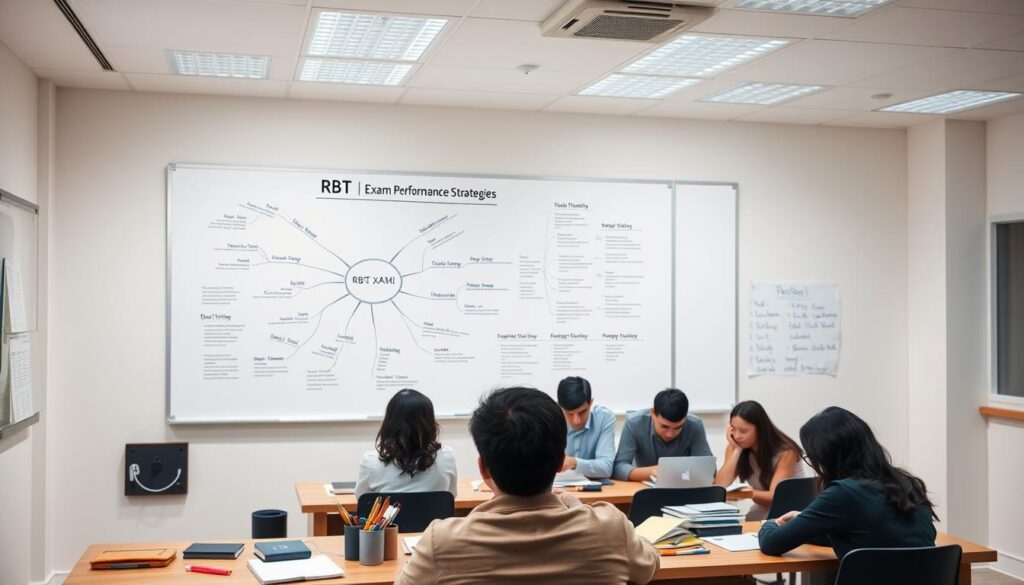
Passing the RBT exam is not just about knowing the material. It’s also about how you prepare mentally. The best strategies focus on making you feel confident and ready, not stressed.
Getting ready for the exam is all about mental strategy. Using the right tips and tricks can make you think better and feel less anxious.
- Develop a pre-exam mental routine
- Practice visualization techniques
- Implement breathing exercises
- Create a positive mindset
Using the right mental tricks can really boost your score. Mental preparation is just as important as studying. Even athletes use these strategies to get ready for big games.
| Performance Strategy | Key Benefit |
|---|---|
| Mindful Breathing | Reduces stress, increases focus |
| Positive Visualization | Builds confidence, reduces anxiety |
| Mental Rehearsal | Improves cognitive preparation |
Experts say certain mental tricks can change how you feel during the exam. By learning and using these methods, you’ll feel more confident and clear-headed.
- Control your physiological response
- Manage test anxiety effectively
- Maintain optimal cognitive performance
Your mental state really affects how you do on the exam. Good mental preparation can make a huge difference in your score.
Mindfulness and Focus Techniques for Better Learning
Learning to be mindful can change how you prepare for the RBT exam. Many don’t talk about how important focus and concentration are. By using mindfulness, you can study more efficiently and remember things better.
Getting better at focusing takes practice. The best ways to study for the RBT exam include mental exercises that are more than just memorizing.
Concentration Enhancement Methods
There are several ways to improve your focus:
- Practice 5-minute meditation before studying
- Use breathing techniques to refresh your mind
- Make a study area free from distractions
- Try interval training to stay focused
Distraction Management Strategies
It’s important to avoid distractions while learning. Here are some tips:
- Turn off your phone’s notifications
- Wear noise-canceling headphones
- Stick to your study schedule
- Learn to focus on what’s important
| Mindfulness Technique | Focus Benefit | Study Impact |
|---|---|---|
| Meditation | Increases concentration | Improves information retention |
| Breathing Exercises | Reduces mental stress | Enhances cognitive performance |
| Interval Training | Maintains mental alertness | Prevents study fatigue |
Adding these mindfulness methods to your RBT exam prep can make you a better learner. Remember, training your mind is as key as learning the material.
Sleep and Memory: Optimizing Rest for Better Results
Sleep is key for memory, which is important when you’re getting ready for the RBT exam. Experts say that good sleep helps you remember things better. Your brain works on storing information while you sleep, making it a big help for your RBT exam prep.
Knowing how sleep and memory work together can really help you study better. Studies show that different parts of sleep help with memory and thinking skills.
- Deep sleep helps move info from short-term to long-term memory
- REM sleep boosts complex problem-solving skills
- Regular sleep patterns improve brain connections
To get better sleep for your exam, try these tips:
| Sleep Strategy | Cognitive Benefit |
|---|---|
| 7-9 hours nightly sleep | Improved memory consolidation |
| Consistent sleep schedule | Enhanced neural pathway stability |
| Pre-sleep review of study materials | Increased information retention |
Pro tip: Make a calm bedtime routine to tell your brain it’s time to rest and process info. By focusing on sleep, you’re not just resting. You’re also helping your brain learn and remember for the RBT exam.
Self-Assessment Strategies for Exam Readiness

Getting ready for the RBT exam is more than just studying. It’s about using strong self-assessment strategies. These help you see how far you’ve come and feel more confident. Research shows knowing your learning path can really help you do better on exams.
Self-assessment is key to getting ready for exams. Psychology experts say it’s important to have a clear plan to check your knowledge and skills.
Progress Tracking Methods
Tracking your progress can change how you prepare for exams. Here are some smart ways to do it:
- Keep a study log to see how much you learn each day
- Take practice tests to find out what you don’t know
- Make a scoring system to see how you’re improving
- Have weekly check-ins with yourself
Confidence Building Techniques
Getting ready mentally is as important as studying. Confidence comes from seeing how far you’ve come and knowing your strengths. Here are ways to get ready for your exam:
- Enjoy small wins in your studying
- Imagine yourself passing the exam
- Use positive words to talk to yourself
- Make a study space that supports you
By tracking your progress and building confidence, you’ll have a solid plan for the RBT exam. This plan covers both your studying and your mental preparation.
Conclusion
Getting ready for the RBT certification exam is more than just memorizing facts. By using proven RBT exam preparation techniques, you can change how you study. This will help you do better on the exam.
It’s not just about studying more, but studying in a smarter way. Learning about memory, managing stress, and understanding how you learn can really help. Each method we talked about is meant to make you think better, feel more confident, and get ready for the exam in a smart way.
Success comes from knowing a lot, getting your mind ready, and having a strong mindset. By using these proven strategies, you’ll not only do well on the exam. You’ll also gain important skills for your career in behavioral therapy. Believe in your preparation, stay focused, and go into the RBT exam with confidence and a smart plan.
Your path to becoming a Registered Behavior Technician is about more than just passing an exam. It’s about building a strong professional base. Use these psychological techniques, stay dedicated to your goals, and you’ll be ready to shine in your RBT certification and career.
